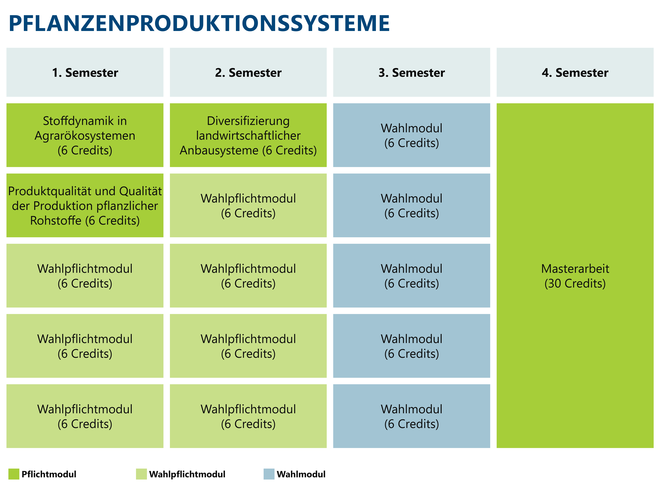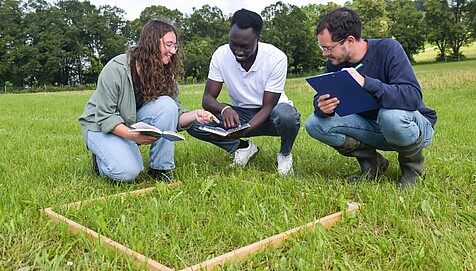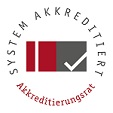Plant Production Systems
One of the most comprehensive plant science degree programs in the world
Agricultural Sciences (Master’s)
Major: Plant Production Systems
One of the most comprehensive plant science degree programs in the world
In the Plant Production Systems major in the Agricultural Sciences degree program, you will deal with the production, processing, and quality of plant-based food and feed as well as non-edible and edible plants for the provision of bioenergy or biobased products. At the University of Hohenheim, you will have access to a comprehensive range of courses covering the entire spectrum from crop production systems, plant nutrition, physiology, phytomedicine, genetics, and breeding to quality aspects, ecosystem services, agroecological approaches (e.g. agroforestry research), and computer simulations. So you can look forward to a diverse subject area!
What you can expect:
- We will help you develop and explore the topics that are important to you.
- Specialize in your subject area: Plant production systems in your fields of interest.
- Take advantage of the wide range of plant science modules offered by our faculty.
- Incorporate aspects relating to sustainability, social and economic relevance as well as the environmental and ethical consequences of agricultural sciences seamlessly into your studies
- Prepare for interesting and varied careers in the agricultural engineering sector, including with internships
- Reasons to choose Hohenheim
| Degree Master of Science | 4 semesters 120 Credits | Language of instruction Deutsch | German | University places unlimited | Location Stuttgart | |||||

Diversity in depth and breadth
There are only three compulsory modules (18 credits) in your Plant Production Systems major. You can choose a further 42 credits (7 modules) from a pool of plant production topics consisting of approximately 25 semi-elective modules. If you would like to broaden your horizons, you can additionally choose modules from the compulsory and semi-elective pool in the soil sciences and/or agricultural engineering subject areas. Ideally, you should complete the compulsory and semi-elective modules in your first year of study. As you progress, you should earn a further 30 credits from elective modules. You can choose elective modules from the entire range of Master's modules offered by the faculty, i.e. including from modules assigned to other Master's programs. If you have a special interest in topics that are not primarily agricultural, you can even choose elective modules from the degree programs offered by our neighboring faculties. If you are interested in a summer school or a stay abroad, this can be easily arranged in the 3rd semester. If you are well prepared, you should have no problem getting your credits recognized.
You would like to know more?
You can download detailed information about the course and structure of the program here:
- Module catalog for Plant Production Systems
- Examination Regulations
- Institute of Crop Science
- Faculty of Agricultural Sciences
What you should bring with you
The Master's degree program in Agricultural Sciences with a major in Plant Production Systems builds on the knowledge you have acquired in general natural sciences and environmental, agricultural, or geosciences in your Bachelor's degree program in agricultural sciences, agricultural biology, biology, geology, environmental sciences, or horticulture. If you have completed one of these Bachelor's degree programs or a related degree program, the Master's in Agricultural Sciences with a major in Agricultural Plant Production Systems is just right for you.
The formal requirements for the Master's program are:
- Bachelor’s degree in agricultural sciences or related subjects from a university in Germany or abroad, or from a university of applied sciences, with a standard period of study of at least 3 years (180 ECTS in total) (for further “related subjects”, see Annex 2 of the Admission Regulations).
- If your final grade or grade point average for that degree is not above average, you can submit separate evidence of your particular aptitude for the program (for details see Admission Regulations § 4).
You should have the following interests and knowledge in addition to the formal criteria:
- Interest in agricultural and plant production topics and want to help shape their future
- Practical experience in agriculture/forestry, horticulture, and the environment is an advantage
- Openness to current issues such as climate action, sustainability, transformation, and ecology
- Eager to participate in “hands-on” activities in the field, greenhouse, or laboratory
- Interest in digital agriculture and AI
Preparing scientific results for use by practitioners
The best way to put your knowledge into practice is through an internship, which you can choose according to your interests and integrate into your studies.
Gaining practical experience
You can integrate an internship in an agricultural company or a company in an upstream or downstream sector into the degree program as part of the elective portfolio module.
Acquiring new skills
You will find additional further education opportunities on campus in the form of the F.I.T continuing education courses, the “Artificial Intelligence and Data Science in Hohenheim” (AIDAHO) certificate, or the start-up support in the “Innovation Greenhouse”.
Learning from practice
The degree program offers you numerous opportunities for practical learning. Lectures by practitioners, projects with companies, exciting exercises and excursions as well as application-oriented projects during your studies give you a direct insight into professional practice and promote your ability to actively apply the knowledge you have acquired.
Strengthening language and intercultural skills
Would you like to improve your language skills? For this purpose, the Language Center at the University of Hohenheim offers various semester and intensive courses that you can take individually during your studies. You can even acquire the UniCert III C1 certificate as part of an elective module. During your studies, you will also acquire intercultural skills naturally by interacting with your fellow students from all over the world.
Researching during your studies
During your studies, you will be able to participate in scientific working groups and gain valuable insights into research practice. By actively participating in research projects, student research projects, and specialized research modules, you become part of the scientific process and acquire qualifications for independent scientific work.
Are you interested in an exchange semester? Make sure to start planning early. A stay abroad is best planned for your 3rd semester. A stay abroad may also be possible as part of your Master's thesis.
We cooperate in research and teaching with 80 partner institutions worldwide, 40 of which are in the ERASMUS program.
The University of Hohenheim’s Office of International Affairs provides extensive information and advice on stays abroad and their financing through scholarships.
What makes our degree program so special?
- Over 700 hectares of experimental fields give you plenty of practical space for your own experiments and research work.
- Benefit from the wide range of crop production topics and the expertise of the Hohenheim Faculty of Agriculture.
- Develop plant cultivation systems that are high-yielding and ecologically sustainable.
- You can choose from a wide range of modules at the Hohenheim Faculty of Agriculture thanks to over 50 professorships. This allows you to get a taste of other topics (e.g. business administration, organic farming, agroforestry systems, nutrition, etc.) in addition to your individual specialization.
- We very much encourage research in national and international projects. We can therefore help you, for example, to join a large collaborative research project or collect data in projects abroad as part of your Master's thesis.
- More good reasons for studying in Hohenheim
Janis Bloh

I am now at:
Ministry of Rural Affairs, Food and Consumer Protection BW (Landratsamt Schwarzwald-Baar-Kreis)
I work there as:
Head of agricultural regulations, business management and teacher at the technical college for agriculture
I benefited from the following during my studies:
"What I found particularly good about studying at Hohenheim was the breadth and depth of the subject matter. In addition to basic modules such as statistics or botany, agricultural modules such as crop production or agroecosystems have been important pillars for my career as well as topics such as valuation and taxation or agricultural business management. Looking back, I can say that my studies gave me a very good foundation for my current tasks. If you like teaching and working with young people, you should think about an agricultural traineeship with the state of BW! You learn a lot in the process and you have many different tasks. In return, you should be willing to take on responsibility."
Hendrik Braun

I am now at:
Corteva Agriscience
I work there as:
Digital Product Manager DACH (Task: developing a strategic roadmap for services from the digital agriculture sector for our seeds and crop protection portfolio).
I benefited from the following during my studies:
“Before I came to Hohenheim, I had already completed a Bachelor's degree in Business Administration in Düsseldorf. With another Bachelor's degree in Agricultural Biology and a Master's degree in Crop Production Systems, I gained the knowledge I need to work for a company in the seed and crop protection industry. In addition, I always had very close contact with the lecturers, and this also motivated me to deepen my knowledge of the subject matter beyond what I needed for the exams. Because of the beautiful campus and the feeling of being part of a community, studying at Hohenheim was absolutely perfect, all in all.”
Interesting and individual career prospects
The Master's in Agricultural Sciences with a major in Plant Production Systems will, depending on your interests, provide you with in-depth knowledge in plant nutrition, plant cultivation, plant protection, plant breeding, and ecology. This will qualify you for careers in agriculture and its upstream and downstream sectors, including scientific careers.
After completing your studies, you will have excellent opportunities in both the national and international job markets. Possible fields of activity include:
The following professions are open to you:
- Managing agricultural operations
- Planning and development
- Research and teaching
- Expert appraisals
- Teaching and advising
- Press and public relations
- Quality assurance
- Breeding and cultivation
- Development aid
- Management or project management
Potential employers include:
- Chemical-pharmaceutical industry
- Service and consulting companies in all areas concerned with agriculture, environmental protection, and resource conservation
- Producer organizations and the food industry
- Cooperatives
- Public and private research institutions
- Public administration
- Plant breeding and seed companies
- Associations
Topics related to agricultural sciences
- Degree program downloads
- Faculty of Agricultural Sciences
- Student Council for Agricultural Sciences
- Student Council for Agricultural Sciences’ Instagram channel: Important announcements from the Student Council for Agricultural Sciences and information about the Student Council’s activities.
- Master’s in Agricultural Sciences: Mailing list for enrolled students for communicating relevant information
| Admission type | Start of studies |
|---|---|
Without admission restrictions | Winter and summer semesters |
| Application deadlines | |
| Winter semester: 15 September (all). Applications should be preferably made by 15 July so that all enrollment formalities can be completed in time for the start of the program. Summer semester: 15 March (all). Applications should be preferably made by 15 January so that all enrollment formalities can be completed in time for the start of the program. | |
| Requirements | |
|---|---|
| Admission requirements | 1. Bachelor’s degree in agricultural sciences, biology, or related subjects from a university in Germany or abroad, or from a university of applied sciences, with a standard period of study of at least 3 years (180 ECTS in total) (for further “related subjects”, see Annex 2 of the Admission Regulations). |
| Selection procedure | |
|---|---|
| Selection criteria | None, as the number of places is not restricted
|
| It is possible to apply to a higher subject-related semester for the winter semester (application deadline: 15 September) and summer semester (application deadline: 15 March). | |
| Application process | |






